On the afternoon of September 11, a group of journalists from 30 countries, including Ethiopia, Kenya, Egypt, and Saudi Arabia, visited the Beijing Polytechnic. The purpose of their visit was to explore Beijing’s internationalized higher vocational education model. During their visit, the group stopped by the institution's three major schools, namely the School of Automotive Engineering, the School of Mechanical and Electrical Engineering, and the School of Art and Design.
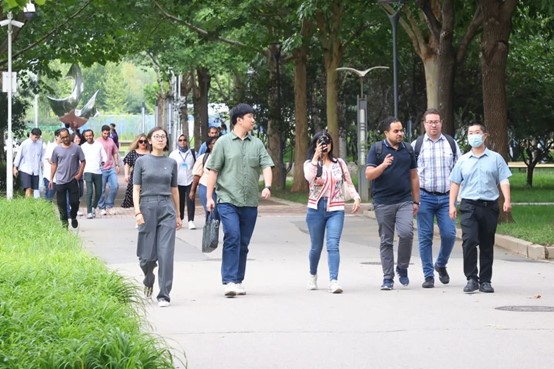
“Running schools together with the world’s top companies not only helps in nurturing high-caliber talent, but also promotes innovative development in industries, which has far-reaching implications,” said a journalist from Algérie Presse Service. “I was surprised to see actual Mercedes-Benz cars on display at the school. The integration of industry and education is based on practice, which can help students acquire the necessary practical skills for business,” said a journalist from Agence Tunis Afrique Presse.
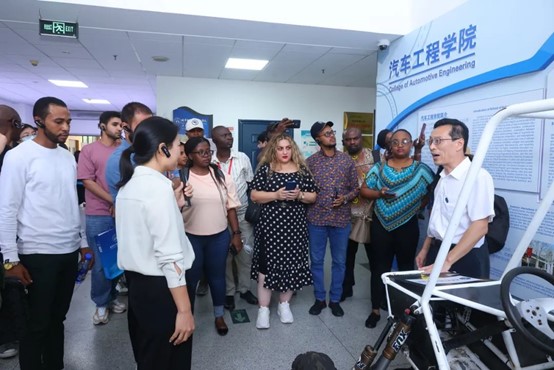
The School of Automotive Engineering is distinguished by its cooperation with world-leading multinational companies. It has established close ties with more than ten prominent automakers, including the Mercedes-Benz Group AG. Journalists captured every detail with their cameras here, commending the school’s internationalized cooperative education model and its remarkable achievements in research and development.

In the comprehensive skills training room of the School of Mechanical and Electrical Engineering, journalists were impressed by the training platform that integrates cutting-edge technologies such as Artificial Intelligence, Machine Vision, Digital Twin, MES system, and Industrial Internet of Things. They believed that this kind of hands-on training at the forefront of scientific and technological development could cultivate a large number of versatile and innovative talent.
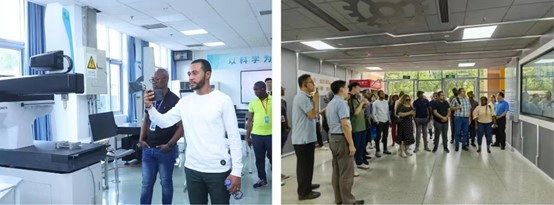
“Vocational education and academic education are closely linked, with the former playing a crucial and indispensable role for all walks of life,” said an editor from the Jordan News Agency. She expressed her hope that the school would be able to expand its cooperation channels in vocational training with companies from Arab countries in the future.
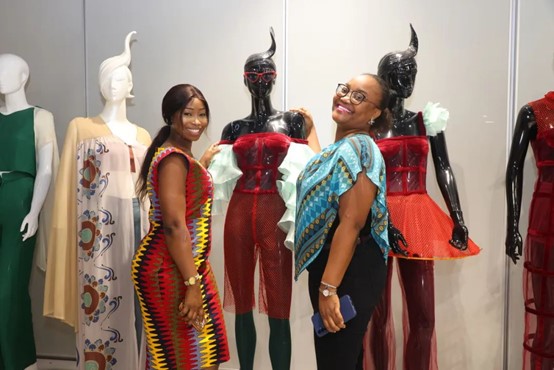
At the School of Art and Design, the group appreciated a variety of works including film and television costumes, fashion garments, and contemporary handicrafts made in traditional techniques. All these works were designed by the teachers and students of the school. The philosophy of the school is to follow international trends while also adapting to practical needs, which has resulted in numerous successful designs that have been applied and commercialized in the market. The exquisite artworks on display deeply impressed the visitors, who eagerly captured every corner of the exhibition hall with their cameras.

In addition to the exceptional educational content offered by Beijing Polytechnic, foreign journalists were greatly impressed by its all-round international development. “I was deeply impressed to learn that the institution has signed cooperation agreements with universities from across the world, including Canada, Tunisia and Morocco. Foreign students can learn the most relevant professional skills in power engineering and many other subjects, which undoubtedly provides more opportunities for their career development,” said a journalist from Tunisia. “More and more foreigners are studying in China. This truly reflects the progress China has made in education,” noted a journalist from Al Mayadeen, a Lebanese news channel.
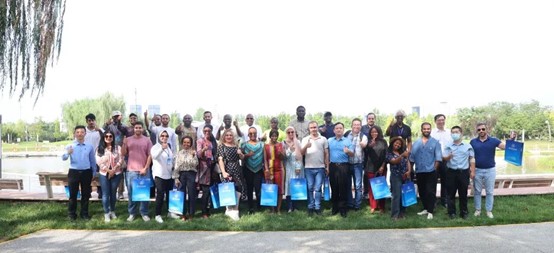
The visit was part of the Fourth Offline Shooting of the Third “Beijing - A Global City” Short Video Contest, which aimed at promoting Beijing as a global city through the lenses of foreign journalists. During the event, the journalists also expressed their appreciation for the opportunity to learn more about the international features and successes of vocational education in Beijing. They are willing to share their experience through their media channels, so as to promote cooperation and exchanges in vocational education between China and the rest of the world.
More Information about Beijing Polytechnic
Beijing Polytechnic was founded in 1958. It is one of the first batch of independently established higher vocational institutions in China and ranks among the top 100 model higher vocational colleges in the country. Located in the Beijing Economic-Technological Development Area, the institution includes six national-level practical training bases and 18 production training bases on its campus. In addition, Beijing Polytechnic has established 260 off-campus internship bases in collaboration with enterprises. In recent years, Beijing Polytechnic has expanded its international cooperation by establishing ties with more than 50 educational institutions from over 10 countries, including the US, Germany, France, the UK, and Canada, to jointly conduct training programs and mutually recognize academic credits. To date, Beijing Polytechnic has received more than 200 delegations from 29 countries and regions.


